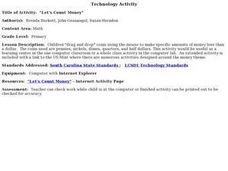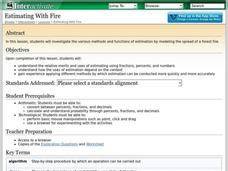Curated OER
"Let's Count Money"
Students participate in an interactive Internet activity that allows them to practice counting money. Students can work independently or cooperatively as they "drag and drop" coins using a mouse.
Curated OER
The Money of Great Britain
Students complete a KWL chart about money including what they would like to learn about the currency of Great Britain. In this British currency lesson, students read a text about this topic and view both American and British pictures of...
Curated OER
St. Patrick’s Day
Combine math, creative writing, and leprechauns in a fun St. Patrick's Day activity! Using a bag of gold coins and marshmallows, kids write a math story about a leprechaun that includes a multi-step equation to solve.
TESCCC
Place Value to 999,999
Master place value with a series of lessons that use math journals, manipulatives, and place value mats. Kids follow the instructions to represent numbers of all sizes with base ten blocks and recording sheets.
Illustrative Mathematics
Gifts from Grandma, Variation 3
There are three money word problems in this activity, each one is set in the same context. The first asks what was the total amount grandma spent, the second how many grandchildren grandma has, and the third asks how much grandma spent...
Project Maths
Outcomes of Coin Tosses
Flip a coin: heads, use the resource; tails, use the resource. The fourth of six installments of the Statistics & Probability unit looks at coin tosses and probability. The class conducts an experiment and sees that the outcomes of...
Shodor Education Foundation
Estimating With Fire
Watch the damage from a forest fire in this interactive simulation activity that challenges learners to estimate the burn area using different approaches. Learners are given a worksheet to track the different burn patterns and practice...
EngageNY
Estimating Centers and Interpreting the Mean as a Balance Point
How do you balance a set of data? Using a ruler and some coins, learners determine whether the balance point is always in the middle. Through class and small group discussions, they find that the mean is the the best estimate of the...
Curated OER
Coin Carnival
Students investigate the value of coins. In this coin value lesson, students read The Penny Pot by Stuart Murphy. Students expand on skills learned in the book and engage in activities to determine the value of a mixed set of coins while...
Curated OER
Pocket Change
Learners practice identifying coins and their values. In this money identification activity, students play a game, where they toll a coin, determine the value, and compare totals to win.
Curated OER
Shopping
Students demonstrate how to count money through a simulated shopping experience. In this consumer math instructional activity, students read the book Just Shopping With Mom and count play money to illustrate how much the items in the...
Curated OER
What's on Sale?
Students explore sale items. For this money and percent math lesson, students work in groups to locate food ads in the newspaper. Students identify sales and calculate final prices using percentage discounts. Students...
Curated OER
Money Smart Choices
Students make choices regarding money management. In this personal finance lesson, students explore budgets, incomes, and expenses as they learn vocabulary regarding personal finance and consider how to create personal budgets.
Curated OER
Currency and Exchange Rates
Fifth graders share the book, "The Story of Money" and discuss the uses of money, bartering, trade and the history of money. Students discuss various ways of spending: cash, check, debit/credit cards and review the check writing process....
Curated OER
Teaching Money
Pupils identify coin/money values, write amounts of money and calculate change. The poem, "Smart" by Shel Silverstein is used in this lesson.
Curated OER
Coupon Activity
Students investigate linear equations. In this linear equations lesson, students participate in an activity where they are given coupons. Students write linear equations based on the coupon. Students discuss how the...
Curated OER
How much money can you earn?
Fifth graders survey how to manage money and the importance of it. Students summarize that each day they have the opportunity to earn or lose money. Students provides many situations to present ways of paying bills and money management.
Curated OER
Scavenger Hunt for Coins of the World--New Zealand, Japan and France!
Students explore the history, culture and currency of the countries they "visit" using the US Mint Coins of the World activity. Students find the answers to a Scavenger Hunt Questions handout for the country being studied. Students...
Curated OER
Medieval Money
Learners investigate the history of money as it was back then compare to now. In this algebra lesson, students analyze the type of money used in medieval times, the value of the currency and the coins used. They make a budget using...
Curated OER
Using Credit: Not for a Billion Gazillion Dollars
Fifth graders explore the concept of credit. In this consumer education lesson, the teacher uses the book Not for a Billion Gazillion Dollars to lead the class in a discussion about credit, debit, and income. Students then analyze their...
Curated OER
Math: Currency Exchange Rates
Sixth graders apply the division and multiplication of decimals to convert dollars to various international currencies. In a travel simulation activity, they convert money, distance, and temperatures. During their "trip," students...
Curated OER
Adding and Subtracting Money
Students investigate U.S. currency by pretending to buy food. In this money lesson, students discover the vocabulary and value for each U.S. coin, then add the amounts in dollars and cents of food items they wish to purchase....
Curated OER
Time Value of Money
Students evaluate the time value of money. In this economics lesson, students define inflation, interest, and the future value of money.
Curated OER
Building Tolerance for Poverty in Math
Students explore approximate and exact solutions. In this interdisciplinary lesson, 6th graders will be placed in 'family groups' to create a budget that is subject to random events as chosen from the 'things happen' box. This lesson...























